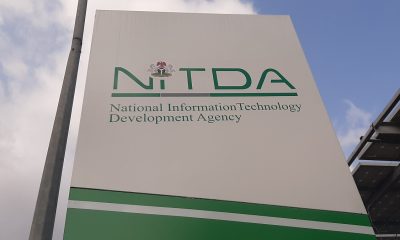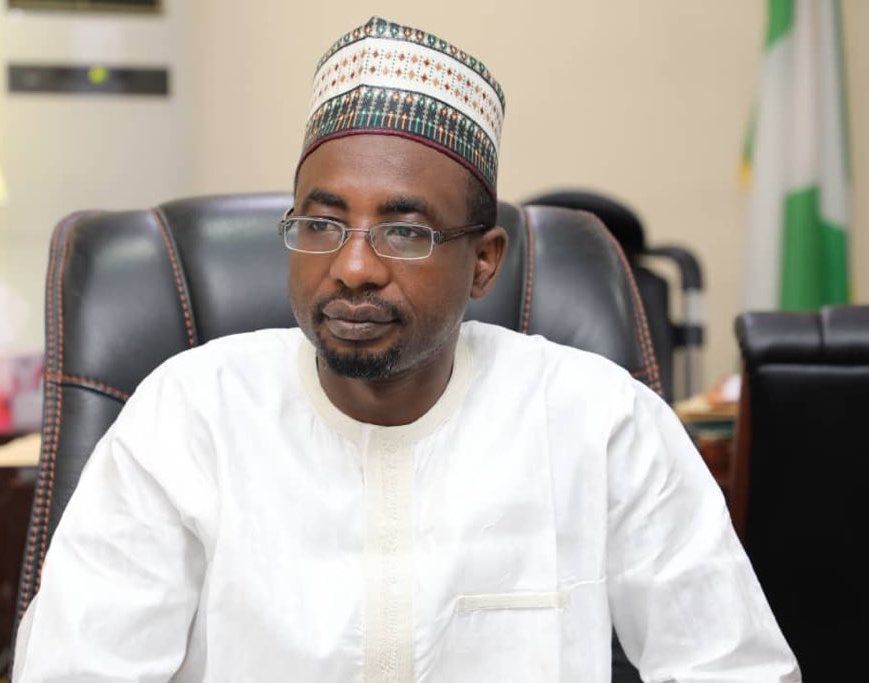Digital Economy
eGovernment, A Blessing To All Nigerians-Pantami
Published
3 years agoon
The Honorable Minister of Communications and Digital Economy, Dr Isa Ali Ibrahim Pantami FNCS FBCS FIIM has said that the administration of President Muhammadu Buhari GCFR is very passionate about the implementation of National eGovernment master plan where eGovernment becomes a blessing to everyone.
The Minister stated this today at the virtual webinar, together with the Director General, National Information Technology Development Agency (NITDA), Mallam Kashifu Inuwa Abdullahi CCIE and MD/CEO of Digital Jewels Ltd, Ms Adedoyin Odunfa and members of the press to commemorate NITDA’s 20th Anniversary.
Dr Pantami in his remark disclosed how he presented a memo with the Head of Civil Service of the Federation before the Federal Executive Council on National Policy for virtual engagements in Federal Public institutions which was approved.
He added that virtual engagements are now formal and institutionalized form of engagements in Nigeria. “At the ministerial level in Nigeria, our responsibility is more on National Policy development and Policy supervision,” the Minister noted.
The Minister stated that his focus was not just to have an active eGovernment but a secure one which will gain the confidence of all Nigerians.
He further disclosed that the National Digital Economic Policy and Strategy (NDEPS) which was developed for a digital Nigeria has eGovernment has one of its pillars and secured through another pillar ‘Cybersecurity”.
He noted that a subsidiary legislation of the Nigerian Data Protection Regulations (NDPR) which is a regulation that protects the privacy of data being implemented by NITDA, is one of the most effective initiatives of the current administration.
“I led a team then that developed the first ever NDPR in order to give confidence to our citizens that any data under the government is secured, and we have been implementing this”, he added.
Dr Pantami mentioned that series of eGovernment trainings have been organized where public and civil servants were trained on eGovernment.
He said some of the trainings are being conducted by NITDA in collaboration with Galaxy Backbone limited, adding that National eGovernment Training Centre which was established by this administration in abuja at the Public Service Institute is a world class training centre where citizens, particularly civil servants and other underemployed or unemployed citizens are being trained.
He said recently, the President has unveiled the National Cybersecurity Policy, and awareness is being created to all citizens on how to cautiously navigate the internet, which is a foundational strategy for eGovernment.
“When you are online, you are exposed to so many challenges. We have been training citizens on cyber security not only at the federal and state levels but at local levels where trainings have been organized. From time to time, we issue advisory notes where citizens are being encouraged to take precautions on potential attacks,” the Minister concluded.
Mallam Abdullahi while giving his remark said that NITDA has recaliberated and refocused her efforts on the implementation of the NDEPS. He disclosed that the Honorable Minister of Communications and Digital Economy unveiled the Agency’s Strategic Road Map and Action Plan which was a turning point for the Agency on digitalization of Nigeria.
“As we push for a digital economy, it is imperative to build the confidence and trust of citizens for either government services or other private services,” the DG noted.
He stated that the NITDA Strategic Roadmap and Action Plan 2021-2024 is anchored on seven strategic pillars; Developmental Regulations which focuses on indices needed to move Nigeria on the eGovernment index. “Some of these regulations are regulatory instruments, guidelines and frameworks that prepare Nigeria for this journey”, the DG noted.
He stated that the Agency issued the NDPR which was to help Nigerians understand data privacy and build confidence for people to use data services.
“The regulations was innovative in the sense that apart from making sure we have a secure digital service, it also created an industry for our country. Data is the greatest resource in the digital economy,” he added.
Abdullahi said that Digital Literacy is another pillar which focuses on capacity building of eGovernment services, noting that it is important to build people’s capacities on proficient use of digital services. He further stated that Digital Transformation is another pillar which uses digital technology for operational excellence in governance and to enhance transformational delivery of traditional government services.
The DG stated that Digital Innovation and Entrepreneurship and Promotion of Indigenous Contents are strategic pillars which basically involves the maximum empowerment and use of local innovations to come up with indigenous made solutions for the Nation. “Last year, the Honorable Minister directed us to come up with innovation challenges in motivating our innovation ecosystem to come up with digital innovation solutions for our country which we have done through various innovation challenges across the country. We are currently working with Mass Challenge to build a framework for innovation challenge across the country”, the DG mentioned.
Abdullalhi stated that Emerging Technologies is a pillar which encourages citizens to develop and adopt strategies for emerging technologies. He said that some of the emerging technologies are foundational techs that cut across so many industries like the block chain, artificial intelligence and robotics.
“However, Cybersecurity is a pillar which is very essential for Digital Economy and Digital Transformation within the government. We are making our cyber space secure and build the confidence of every Nigerian citizen,” Abdullahi concluded.
While making her presentation, Ms Adedoyin Odunfa, Managing Director/Chief Executive Officer, Digital Jewels, said the United Nations Sustainable Development Goals has aligned with NITDA in the areas of poverty eradication, gender equality, industry, innovation and infrastructure among others.
She disclosed that a survey on eGovernment development status was carried out in 193 United Nations Member States which reflected the importance of eGovernment to sustain the Sustainable Goals.
She categorically stated that if eGovernment is implemented effectively in any country, it will help in achieving the UN Sustainable Development Goals.
Ms Odunfa noted that facilitating policies and services through eGovernment, Open government data for promoting effective & transparent institutions, eGovernment for policy integration and e-participation to promote participatory decision making and service delivery are key trends to be considered in eGovernment.
You may like
-


NASENI To Partner NITDA On Local Content Capacity Development
-


Dr Vincent Olatunji, National Commissioner of NDPB appointed into Forbes Technology Council 2023
-


NITDA Engages Private Sector To Boost Nation’s Digital Skills
-


Broadband Penetration, National Identity, Key To Attaining Digital Economy– DG NITDA
Digital Economy
Digital Technologies Directly Benefit 70% of SDG targets- ITU, UNDP and partners
Published
7 months agoon
October 2, 2023More than two-thirds of the UN’s targets for sustainable development can benefit directly from digital technologies, according to the International Telecommunication Union (ITU) and the United Nations Development Programme (UNDP), organizers of SDG Digital which opened today at United Nations Headquarters in New York.
With digital technologies so closely linked to the Sustainable Development Goals (SDGs), the SDG Digital event highlights how safe, inclusive and scalable digital solutions can put the 2030 Agenda for Sustainable Development back on track amid concerns that the world may miss the vision for people, planet and prosperity that was set in 2015.
The SDG Digital Acceleration Agenda, a global analysis of the connections between digital technologies and sustainable development, was released as part of SDG Digital to provide a roadmap to governments on their digital transformation journey and to promote action and financing.
“With only a fraction of the SDGs on track at the halfway point of the 2030 Agenda, it is urgent to ensure that everyone, everywhere can build their own digital futures,” said ITU Secretary-General Doreen Bogdan-Martin and UNDP Administrator Achim Steiner in the foreword of SDG Digital Acceleration Agenda. “The recent breakthroughs in digital technology have unleashed unprecedented opportunities, and with them new avenues for digital innovation in our race against time to fulfil the promise of the 2030 Agenda.”
Uniting around digital to drive sustainable development
According to UN assessments, progress on half of the 169 SDG targets is either weak or insufficient at the 2030 Agenda’s halfway point. Thirty per cent of the SDG targets have either stalled or gone in reverse.
With digital transformation demanding joint efforts between the private sector, financial institutions, civil society, the UN, governments and young people, SDG Digital brings together experts, policy-makers and business leaders to explore the achievements, gaps and solutions on how digital technologies can support the 2030 Agenda.
Scale and innovation accelerate transformation
The SDG Digital Acceleration Agenda, developed by ITU and UNDP together with Boston Consulting Group (BCG) as knowledge partner, and the Inter-American Development Bank (IDB) as Agenda supporter, shows how digital technologies kickstart economic and societal transformation by creating scale and efficiencies.
The Agenda features digital solutions that are already demonstrating how tech can directly benefit 119 of the 169 SDG targets, or about 70 per cent, including in areas such as climate action, education, hunger and poverty.
“When you look at these game-changing digital solutions, you can see the actual building blocks that can drive us toward universal and meaningful connectivity,” said Bogdan-Martin. “This is how we can – and will – work together to ensure our shared digital future is inclusive, sustainable, and safe and responsible – and to do it in this decade.”
Data in the SDG Digital Acceleration Agenda suggest that countries which improved their digital maturity—as measured by digital affordability and infrastructure indices—outpaced their peers in SDG progress for selected income levels.
The Agenda also profiles the opportunities for sustainable development offered by advancements such as generative AI, 5G networks, and blockchain.
Financing and joint action bring scale and innovation
Digital transformation requires considerable investment in connectivity infrastructure, building up digital skills, and creating the conditions for job retraining and new opportunities.
SDG Digital highlights that the funding gap of over USD3.7 trillion for the SDGs should focus international efforts on enablers—such as infrastructure and connectivity—as well as the pooling of resources through collaboration including the private sector and the utilization of diverse financing methods.
Digital public infrastructure as a catalyst for the SDGs
The formal opening of SDG Digital is part of the UN’s SDG Action Weekend, a series of High Impact Initiatives focused on mobilizing further leadership and investment to bring progress to scale between now and 2030. This includes the UN High Impact Initiative on Digital Public Infrastructure to scale inclusive and open digital ecosystems for the SDGs.
Today’s decisions by countries on how to build their digital public infrastructure (DPI) will have lasting consequences on their opportunity to grow and innovate, and to achieve the SDGs by 2030.
As highlighted in a recent G20 publication supported by UNDP, DPI – built on robust governance and strong local digital ecosystems – can deliver value and high impact across all of the 17 SDGs to leave no one behind.
“Digital public infrastructure represents the ‘roads and bridges’ of our new era on which countries can ‘transport’ a range of vital services to citizens, from e-health and e-government services to online education and social protection,” said Achim Steiner. “As our global community’s shared plan for a better future in the Sustainable Development Goals faces challenges, bold investments in DPI by governments are a tried-and-tested means to get them back on track — an ambition that the UN is matching by empowering 100 countries with a range of now-vital DPI solutions to ensure that everyone, everywhere can build their own digital futures.”
Digital Economy
Championing An Inclusive Digital Identity Approach In Africa – At Scale
Published
11 months agoon
May 27, 2023As digitisation accelerates across Africa, the demand for liveness detection and online identity authentication services has become critical. The act of identifying ourselves is under rapid transformation, especially when it comes to using biometrics to access financial and governmental services. If executed correctly, this offers an opportunity for greater inclusivity than ever before.
Gur Geva, Founder and CEO of iiDENTIFii, says, “Face biometrics offers a ground-breaking solution to identity verification (IDV) on the continent in that it is secure and simple to use. Yet this solution will only truly work if the algorithm that underpins face biometrics is trained on the full scope of African faces and can be executed at scale.”
Historically, proof of identity was only available to those who could fulfil a rigid set of criteria. One of the main barriers to a person opening a bank account, for example, would be the inability for them to prove their identity without any formal identity document or proof of formal address. According to the World Bank, 57% of Africans still do not have any kind of bank account, including mobile money accounts. This translates to about 360 million adults in the region and approximately 17% of the total global unbanked population without access to formal financial services, a recent study by BPC and Fincog found.
Sustainable Development Goal 16:9 aims “to provide legal identity for all, including birth registration by the year 2030”. Digital identity plays an active role in meeting several other SDGs, including universal health and education access and financial inclusion.
Remote face authentication is a crucial step in bridging the digital divide in Africa.
Geva explains, “The digitally excluded are missing out on access to social and financial inclusion. Those who do not have access to newer technologies are disadvantaged in healthcare, education and financial support. The mere ability to confirm one’s identity digitally is a key that opens the doors to essential financial and civic services without the risk of impersonation or fraud.”
Diversity in face recognition is the key factor for success in Africa. Yet historically, a large-scale database of African faces has been lacking. Thanks to new developments in technology, this barrier is no longer in place. Geva adds, “Respecting diversity in biometric authentication is a core consideration in our business. For this reason, we have trained our algorithm on over 50 million African faces. This translates into identity for all, but specifically identity for all Africans.”
Through a triangulated authentication process, iiDENTIFii’s technology establishes that the person on the other end of the screen is real, live and transacting at that moment. This multi-faceted facial scan is further verified with key data from the person’s ID document and information from the relevant government databases. “Identity fraud has historically been difficult to detect. Our technology can authenticate and automatically onboard a person in under 30 seconds. Our algorithm vastly reduces false accept and reject rates, fully protecting consumers and businesses,” says Geva.
A focus on verifying a living person, in other words establishing ‘liveness’, ensures that correctly mapping and verifying a diverse range of faces is possible. Geva explains, “With our technology, we are able to establish 3D passive and 4D biometric liveness. Our 4D Liveness is resilient to deepfake and replay attacks. It comprises different colour lights that reflect in a certain sequence off the user’s face which helps determine true biometric liveness.”
Inclusivity in technology extends beyond diversity. It also raises the issue of accessibility. “We have created a technology platform that can be used by very low-end through to very high-end smartphones,” says Geva, “Users can also access the platform via a mobile Software Development Kit (SDK), as well as web-based/browser SDK – which allows them to just click on a link to authenticate themselves, as opposed to downloading a large SDK onto their phones.”
With a simple, fast and secure approach that takes the full scope of African faces into account, biometrics becomes a compelling catalyst for financial and social inclusion. Geva concludes, “We believe that, with the right technology, all Africans can claim their identity and use it to their safety and benefit.”
Digital Economy
Interswitch Group Partners Credit Bank of Kenya and IFAD to Deepen Remittance Play
Published
12 months agoon
May 1, 2023Interswitch Group, Africa’s leading integrated payments and digital commerce company, has announced a partnership with Kenyan lender, Credit Bank, the International Fund for Agricultural Development (IFAD) and Ria Money Transfer.
The partnership will facilitate the provision of diaspora cash remittance services to rural recipients in Kenya through the Savings and Credit Cooperative Society (SACCOs).
Tagged the Affordable Remittances and Enhanced Financial Inclusion Programme, the initiative will enable unbanked rural remittance receivers to access formal banking services through a basic and transparent bank account and see Interswitch and its partners collaboratively train and build capacity for over 1,350 SACCO members.
Credit Bank projects that during the initial phase of the programme, it will reach at least 1,200 Kenyans living in the diaspora and facilitate at least 1,500 rural recipients back home to open a bank account for the first time.
Thus far, the initiative has onboarded three SACCOs that will be engaged in the next 16 months, with projections to onboard seven more over the next 36 months. The SACCOs will have their staff appointed as sub-agents in the rural Kenyan areas which are currently underserved by formal remittance providers.
Speaking on the partnership, Founder and General Managing Director of Interswitch Group, Mitchell Elegbe stated that the collaboration is indeed a significant stride towards bridging the financial divide, empowering more individuals and businesses in Kenya with access to modern payment solutions, and creating a more inclusive financial ecosystem for all.
“This partnership with Credit Bank of Kenya and IFAD marks an important step as we continue to expand our reach and provide innovative solutions for our customers worldwide. As we all know, remittance plays a crucial role in the lives of many people, and we are committed to making it simpler, faster, and more affordable” he added.
According to Romana Rajput, the Country General Manager of Interswitch Kenya, “SACCOs form an important part of our financial services in Kenya where we come together to save money and improve the quality of our lives through lower interest rates loans to acquire important purchases like land, homes, educate our children, improve our businesses and much more. Working with SACCOs and their members will make transfers quicker and more convenient for beneficiaries.”